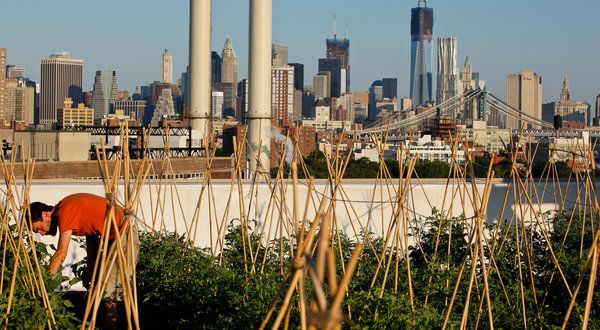
Cities have the potential to be tremendously green. Heavy use of public transit, coupled with smaller living spaces and a general concentration of impact, mean that the average citizen living in Manhattan (theoretically), has a carbon footprint much smaller than a typical suburbanite. The problem is, feeding these city dwellers involves importing food from around the world.
Luckily, urban farming, which used to be a fringe concept for hippies and squatters, is taking hold in Manhattan and in cities across the country. With limited green space, these farms are forced upward, to the roofs of homes and businesses across the city.
The benefits for the cities (both residents and governments) are innumerable - decreased storm water runoff, decreased carbon usage for cooling, more local produce, job creation, etc. And city-living isn't so bad for the growers either - pest control is much easier in the city, where deer and rabbits are not as common.
Farms are popping up all over New York (which seems to be the mecca for urban-rooftop farming), and selling their produce at nearby supermarkets and corner stores. Certainly, the farms don't have the capacity to feed the entire city, but it is a step in the right direction. More importantly, it starts a conversation about food systems and the miles our food travels before arriving on our plate.
In Rooftop Farming, New York City as a Leader from The NY Times
I love nothing more than a summer tomato (maybe add some balsamic, basil, and home-made mozz). In my free-time, I cook, read about cooking, farm, read about farming, and eat. Food is a basic necessity, but good food ought to be a fundamental right.
See what other Food52 readers are saying.